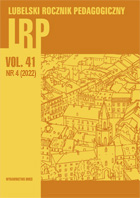Koncepcje nowoczesnego wychowania społeczno-moralnego w Królestwie Polskim na przełomie XIX i XX w.
Concepts of Modern Social and Moral Education in the Kingdom of Poland at the Turn of the 19th and 20th Centuries
Author(s): Aneta Bołdyrew, Joanna FalkowskaSubject(s): History of Education, Pedagogy
Published by: Wydawnictwo Naukowe Uniwersytetu Marii Curie-Sklodowskiej
Keywords: moral and civic education; modernity; pedagogical thought;
Summary/Abstract: Introduction: Modernisation transformations within the Polish lands at the end of the 19th and the beginning of the 20th century were linked to the development and popularisation of scientific pedagogy and the growing importance of children and youth in social life. The postulates of universal education were connected with the need to develop concepts of upbringing, corresponding to the requirements of modern reality, in Polish realities, which was also a period of irredentist aspirations. Research Aim: The aim of the article is to discuss the concept of socio-moral upbringing in the Kingdom of Poland during a period particularly important for the formation of Polish modernity and independence. The subject of analysis will be the propagated norms of upbringing of the young generation, concerning ethical and civic attitudes. The research will make it possible to determine the continuation of the traditional reflection on socio-moral upbringing and to indicate the essence and conditions of the new concepts. Evidence-based Facts: In the studies on the history of the concepts of social and moral upbringing conducted until now, there is a lack of analysis of these issues from the perspective of social and cultural transformations resulting from modernisation processes in the modern era. Previous studies have referred to some of the concepts of social and moral upbringing of Polish pedagogues of the turn of the 19th and 20th centuries, without, however, considering the context of the era to a greater extent. The preserved sources allow an in-depth historical-pedagogical analysis. The texts under research spoke about the character education, self-education, the development of social and civic attitudes, the importance of ethics lessons. Summary: Socio-moral education was given an autotelic value, but also a unifying value, serving egalitarian social relations. At the beginning of the 20th century, it was often combined with citizenship. Viewed in this way, education was considered particularly important for the processes of modernisation and democratisation of society.
Journal: Lubelski Rocznik Pedagogiczny
- Issue Year: 41/2022
- Issue No: 4
- Page Range: 7-21
- Page Count: 15
- Language: Polish

